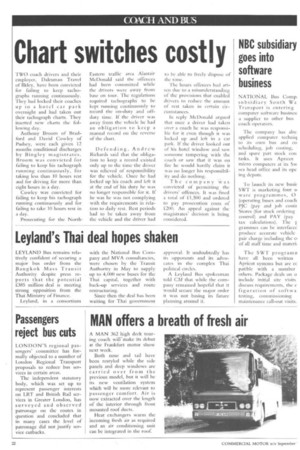Chart switches costly gNoBeCssinutbosidiary
Page 24

If you've noticed an error in this article please click here to report it so we can fix it.
TWO coach drivers and their employer, Dalesman Travel of Ilkley, have been convicted for failing to keep tachographs running continuously. They had locked their coaches up in a hotel car park overnight and had taken out their tachograph charts. They inserted new charts the following day.
Anthony Broom of Bradford and David Cowley of Pudsey, were each given 12 months conditional discharges by Bingley magistrates. Broom was convicted for failing to keep his tachograph running continuously, for taking less than 10 hours rest and for driving for more than eight hours in a day.
Cowley was convicted for failing to keep his tachograph running continuously and for failing to take 10 hours rest in a day.
Prosecuting for the North,
Eastern traffic area Alastair McDonald said the offences had been committed while the drivers were away from base on tour. The regulations required tachographs to be kept running continuously to record the on-duty and offduty time. If the driver was away from the vehicle he had an obligation to keep a manual record on the reverse of the chart.
Defending, Andrew Richards said that the obligation to keep a record existed only up to the time the driver was relieved of responsibility for the vehicle. Once he had locked up his coach and left it at the end of his duty he was no longer responsible for it. If he was he was not complying with the requirements in relation to daily rest. Rest periods had to be taken away from the vehicle and the driver had to be able to freely dispose of the time.
The hours offences had arisen due to a misunderstanding of the provisions that enabled drivers to reduce the amount of rest taken in certain circumstances.
In reply McDonald argued that once a driver had taken over a coach he was responsible for it even though it was locked up and left in a car park. If the driver looked out of his hotel window and saw someone tampering with the coach or saw that it was on fire he would hardly claim it was no longer his responsibility and do nothing.
The company was convicted of permitting the drivers' offences. It was fined a total of £1,500 and ordered to pay prosecution costs of £200. An appeal against the magistrates' decision is being considered.




































































































